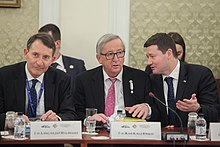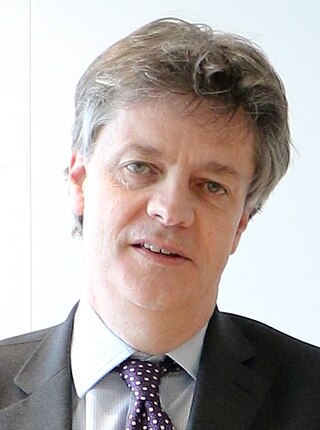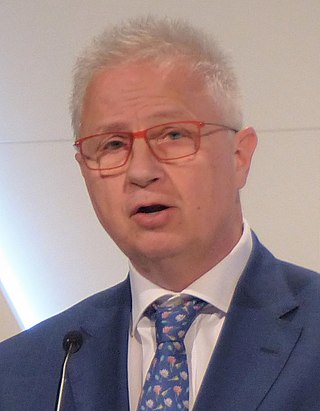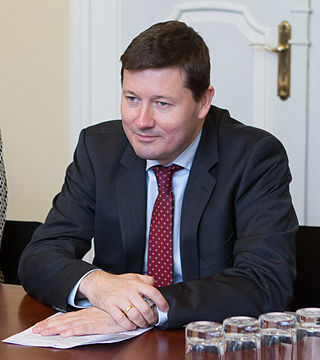
On 21 February 2018, Martin Selmayr was appointed Secretary-General of the European Commission (EC). The appointment was widely criticised as being intransparent and bypassing established appointment procedures. Selmayr resigned in July 2019. [1]

On 21 February 2018, Martin Selmayr was appointed Secretary-General of the European Commission (EC). The appointment was widely criticised as being intransparent and bypassing established appointment procedures. Selmayr resigned in July 2019. [1]
Selmayr had become known within the EU institutions for the fast pace of his promotions. [2] [3] He had been chief-of-staff for President of the Commission Jean-Claude Juncker since 2014. [4] [5] In that role, he had amassed significant influence within the EC and was often described as the "monster of the Berlaymont" by colleagues and media. [6] [5] [7] [8]
Selmayr had originally applied for the position of Deputy Secretary-General. [5] He was appointed to the position in a meeting of the College of Commissioners, composed of the 28 Commissioners of the EC, on the morning of 21 February 2018. Juncker then informed the Commissioners that incumbent Secretary-General Alexander Italianer would be retiring and suggested that Selmayr take his place. [7] Selmayr's promotion to Secretary-General was confirmed by the Commissioners in the same meeting. Reportedly, the appointment was added to the meeting agenda shortly before the meeting took place "in a bid to avoid the news being leaked and to prevent commissioners from coordinating opposition to the move." [4]
The procedure was criticised as having bypassed legitimate appointment procedures by various Members of the European Parliament, including some belonging to parliamentary groups that supported Juncker. [9] A parliamentary motion called Selmayr's promotion "coup-like" and argued that it may have "overstretched the limits of the law". [10] This was initially denied by the EC. [7] Juncker reportedly threatened to resign if the controversy led to Selmayr's dismissal. [11] On 25 March 2018, the EC issued a formal statement claiming that Selmayr's promotion was in accordance with legal procedures. [12] Günther Oettinger, at the time German Commissioner for Human Resources and present at the meeting, described the promotion as "by the book". [7]
The EC's Ombudsman office began investigating the appointment after it received two formal complaints. [13]
On 31 August 2018, the Ombudsman published its report on the matter, which sharply criticised the EC and found multiple instances of wrongdoing. [14] [15] [16] Specifically, four instances of maladministration were identified. The Ombudsman criticised that the Commission had failed to account for conflicts of interest in appointment procedures, that the composition of the appointment committee was inappropriate, that the appointment was procedurally flawed, and that artificial time constraints in the appointment procedure limited the ability of Commissioners to evaluate alternative candidates. [17]
The report also criticised the EC's response to concerns from MEPs as "defensive, evasive and, at times, combative." [18]
The appointment was also criticised for further strengthening the influence of Germany within the EU; at the time, many important positions within the institutions of the EU were held by German nationals. [16] [7] [19]

The European Parliament (EP) is one of the two legislative bodies of the European Union and one of its seven institutions. Together with the Council of the European Union, it adopts European legislation, following a proposal by the European Commission. The Parliament is composed of 720 members (MEPs), after the June 2024 European elections, from a previous 705 MEPs. It represents the second-largest democratic electorate in the world, with an electorate of around 375 million eligible voters in 2024.

The European Commission (EC) is the primary executive arm of the European Union (EU). It operates as a cabinet government, with 27 members of the Commission headed by a President. It includes an administrative body of about 32,000 European civil servants. The commission is divided into departments known as Directorates-General (DGs) that can be likened to departments or ministries each headed by a Director-General who is responsible to a Commissioner.

The president of the European Commission, also known as president of the College of Commissioners or prime commissioner, is the head of the European Commission, the executive branch of the European Union (EU). The president of the commission leads a cabinet of commissioners, referred to as the college. The president is empowered to allocate portfolios among, reshuffle, or dismiss commissioners as necessary. The college directs the commission's civil service, sets the policy agenda and determines the legislative proposals it produces. The commission is the only body that can propose, or draft, bills to become EU laws.

Jean-Claude Juncker is a Luxembourgish politician who was the 23rd prime minister of Luxembourg from 1995 to 2013 and 12th president of the European Commission from 2014 to 2019. He also was Finance Minister from 1989 to 2009 and President of the Eurogroup from 2005 to 2013.

Ján Figeľ is a Slovak politician. Figeľ served as European Commissioner from 2004 to 2009, then as Slovak minister of Transports from 2010 to 2012. From 2016 to 2019 he was European Commission special envoy for the promotion of freedom of religion outside the EU.

Manfred Weber is a German politician who has been serving as President of the European People's Party (EPP) since 2022 and as Leader of the EPP Group in the European Parliament since 2014. He has been a Member of the European Parliament (MEP) from Germany since 2004. He is a member of the Christian Social Union (CSU), part of the European People's Party.

Margrethe Vestager is a Danish politician currently serving as Executive Vice President of the European Commission for A Europe Fit for the Digital Age since December 2019 and European Commissioner for Competition since 2014. Vestager is a member of the Danish Social Liberal Party, and of the Alliance of Liberals and Democrats for Europe Party (ALDE) on the European level.

The Commissioner for Internal Market is a member of the European Commission. The post is currently held by Commissioner Thierry Breton.

The European Civil Service is a generic term applied to all staff serving the institutions and agencies of the European Union (EU). Although recruitment is sometimes done jointly, each institution is responsible for its own internal structures and hierarchies.

Kristalina Ivanova Georgieva-Kinova is a Bulgarian economist serving as the 12th managing director of the International Monetary Fund since 2019, and the first person from an emerging market economy to lead the institution. Born in Sofia, her university education was at London School of Economics (LSE), followed by a return to her native Bulgaria where she witnessed some of the economic hardships of the post-Communist transition. She began her career by teaching economics, becoming a prominent figure in the field.

Jonathan Hopkin Hill, Baron Hill of Oareford, is a British Conservative politician and former European Commissioner for Financial Stability, Financial Services and Capital Markets Union. Hill was Leader of the House of Lords and Chancellor of the Duchy of Lancaster from 2013 to 2014. Prior to that, he served as Parliamentary Under-Secretary of State for Schools from 2010 to 2013 in the Conservative-Lib Dem Government.

Věra Jourová is a Czech politician and lawyer who has been the Vice President of the European Commission for Values and Transparency since 1 December 2019 and previously served as the European Commissioner for Justice, Consumers and Gender Equality from 2014 to 2019. She served as a Member of the Chamber of Deputies between 2013 and 2014 and as the Czech Minister for Regional Development in 2014.

The Juncker Commission was the European Commission in office from 1 November 2014 to 30 November 2019. Its president was Jean-Claude Juncker, who presided over 27 other commissioners. In July 2014, Juncker was officially elected to succeed José Manuel Barroso, who completed his second five-year term in that year.

László Trócsányi is a Hungarian lawyer, academic, diplomat, politician and Member of the European Parliament (MEP) since 2019. Formerly, he was the Hungarian Ambassador to Belgium and Luxembourg from 2000 to 2004, a member of the Constitutional Court of Hungary between 2007 and 2010 and Hungarian Ambassador to France from 2010 to 2014. He was Minister of Justice in the third and fourth Orbán cabinets, from 6 June 2014 to 30 June 2019.

Martin Selmayr is a European civil servant from Germany who was Secretary-General of the European Commission from 2018 to 2019 and chief of staff to Commission President Jean-Claude Juncker from 2014 to 2018. During his time in the Juncker Commission, Selmayr was widely described as one of the most influential figures within the European Union. After taking office as secretary-general, he was described in a debate in the European Parliament as "the most powerful bureaucrat in the world." A resident of Brussels since 2000, he is a member of the Christian Democratic and Flemish (CD&V) party of Belgium. He is considered by many to be close to the Christian Democratic Union of Germany and its leadership, but the European Commission said he has never been a member of that party.
Clara Martínez Alberola is a Spanish lawyer and a European civil servant. From March 2018 to November 2019, she served as the Head of Cabinet to the President of the European Commission, Jean-Claude Juncker.

An election of Members of the European Parliament from Hungary to the European Parliament was held on 26 May 2019, electing the 21 members of the Hungary delegation to the European Parliament as part of the European elections held across the European Union.

The von der Leyen Commission is the current European Commission, in office since 1 December 2019 and is to last until the formation of the forthcoming Second Von der Leyen Commission. It consists of one commissioner from each of the member states of the European Union – including Ursula von der Leyen, its president, who is from Germany.

Olivér Várhelyi is a Hungarian lawyer and diplomat, and European Commissioner for Neighbourhood and Enlargement from Hungary in the von der Leyen Commission after the rejection of László Trócsányi by the European Parliament.
Irène Souka is a former European civil servant from Greece who served in the European Commission for 40 years starting in 1980. From May 2009 to January 2020, she was director general of the Directorate-General for Human Resources and Security. As of 2015, Souka was one of only six female directors-general among the 35 directors within the European Commission.